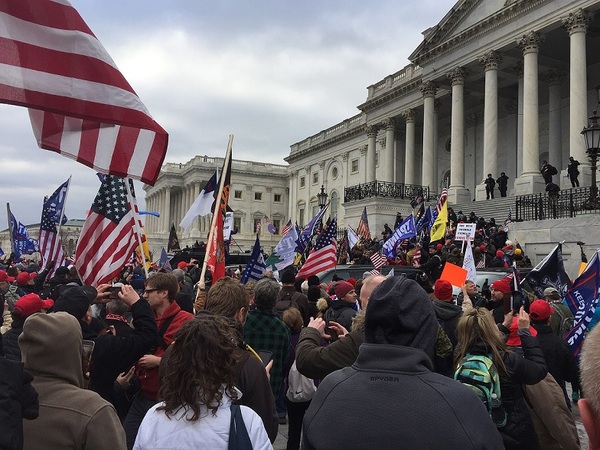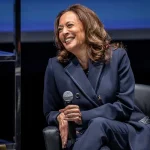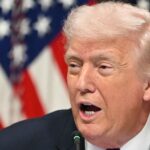
–>
March 17, 2023
Tucker Carlson’s release of January 6th footage raises questions about the status of free speech and due process of law. For more than two years, politicians, media, and big tech have worked together to proliferate a narrative: January 6th was an entirely “violent insurrection,” and according to Vice President Kamala Harris, even on par with the bombing of Pearl Harbor and the September 11th terrorist attacks. Department of Justice (DoJ) prosecutors have worked diligently to publicize and penalize all participants, including the peaceful ones, to the most severe extent possible.
‘); googletag.cmd.push(function () { googletag.display(‘div-gpt-ad-1609268089992-0’); }); }
On March 3, 2023, during the “True Stories of January 6” panel at CPAC, some of the peaceful participants of the migrated Save America rally (often referred to as J-6ers) described the day and its aftermath. Yes, there was undoubtedly violence. But not all of protestors were violent, not even most. Like their fellow Americans who were horrified at the dominant media coverage of protestors breaking windows and wreaking havoc in and around the west side of the Capitol, the panelists all strongly condemned the violence.
Among them was Dr. Simone Gold, the founder of America’s Frontline Doctors, who had been invited to speak on January 6. She was on the east side of the building, which was peaceful, even “joyful,” said Gold. The doctor and Stanford-educated lawyer witnessed the 20,000-pound Columbus Doors opening, not forcefully, but from the inside. She assumed that meant she was allowed to enter the building.
While in the Capitol, Gold stayed within the velvet ropes and delivered her speech against government vaccine mandates and lockdowns. She told the CPAC audience that she “had never seen a more respectful crowd.” In her mind, they were not seditious rioters, but patriots and guests of the Capitol. If not, who opened the Columbus Doors for them and why was no one getting arrested? Gold was in the Capitol for about 45 minutes, 25 of which she was waiting for an opportunity to exit as more people poured into the building. Having enjoyed the experience and not knowing there was any wrongdoing, she posted a clip of peaceful footage on social media, which was subsequently banned. Social media outlets were removing peaceful footage, in favor of the clips quite familiar to us now.
‘); googletag.cmd.push(function () { googletag.display(‘div-gpt-ad-1609270365559-0’); }); }
Despite the extensive video footage supporting her claims, Gold was charged with obstructing a proceeding of Congress, a felony punishable by up to 24 years in prison. Like many other J-6ers facing the same charges, she accepted a plea deal. The U.S. district judge for the District of Columbia, Christopher Cooper, sentenced Gold to 60 days in prison, followed by 12 months of supervised release and a $9,500 fine.
John Strand, Gold’s bodyguard and co-defendant, rejected the plea deal. He was found guilty on all charges and faces sentencing of more than 20 years in prison. During the CPAC panel, Strand criticized the court’s verdict, “I am an individual. I should be answering for my actions, not the crowd’s”
Another panelist, Brandon Straka, who founded the #Walk-Away movement, was also present on January 6 for a speaking engagement. He captured an eight-minute video from the top of the Capitol steps on the east side, and left when he was told to. He never entered the Capitol, but was sentenced to three months of home detention, three years of probation and a $500 fine, after taking a plea agreement. Straka, a self-proclaimed patriot, told the panel’s audience that he managed to withhold tears throughout his arrest and detainment process until he heard the words uttered in court: “United States of America v. Brandon Straka.”
When Straka made that comment, another panelist, Derrick Evans, nodded in understanding. Evans, a West Virginia state legislator and one of the first J-6ers arrested, fist-bumped a police officer as he walked through the east side doors of the Capitol, and thanked him for his service. He was never instructed not to enter the building. He echoed Gold’s statement that the crowd he saw was respectful and “self-policing” inside the Capitol. The next day, given the media coverage, Evans thought the FBI might want to speak to him. He retained a lawyer, who contacted the DoJ and FBI. He preferred to go in himself, rather than have his four children (all under five years old at the time) experience the trauma of watching their father be arrested. His lawyer was told that wouldn’t be necessary.
 On January 8, 2021, the media arrived to Evans’ house unannounced and set-up their tripods and cameras in his yard. Shortly thereafter, the FBI pounded on his door and cuffed his hands at his house in front of his young children. Initially, Evans was charged with four misdemeanors, but then a felony obstruction charge appeared at the eleventh hour. The prosecutor told Evans and his lawyer that the addition of the felony was “coming from the highest levels of the DoJ” and that she had never experienced anything like it before. Following a plea deal, Evans spent three months in prison, with three years of supervised release, and paid $2,000 in restitution. His appearance on the CPAC panel marked the first time he traveled since serving his term.
On January 8, 2021, the media arrived to Evans’ house unannounced and set-up their tripods and cameras in his yard. Shortly thereafter, the FBI pounded on his door and cuffed his hands at his house in front of his young children. Initially, Evans was charged with four misdemeanors, but then a felony obstruction charge appeared at the eleventh hour. The prosecutor told Evans and his lawyer that the addition of the felony was “coming from the highest levels of the DoJ” and that she had never experienced anything like it before. Following a plea deal, Evans spent three months in prison, with three years of supervised release, and paid $2,000 in restitution. His appearance on the CPAC panel marked the first time he traveled since serving his term.
Apart from their judicial punishments, the panelists discussed the other penalties they suffered. They were deplatformed on social media. Straka was evicted from his apartment. Chase bank pulled Evans’ mortgage note, giving him 45 days to pay off the remaining balance owed on his house. As a convicted felon, he also lost his right to possess a weapon. Several of the panelists’ banks canceled their accounts, including Gold’s, who said she had a perfect credit score. All J-6 defendants’ names continue to appear on a public registry of charges, despite the outcomes of their cases. And that doesn’t even begin to scratch the surface of the social and professional fallout for the J-6ers.
‘); googletag.cmd.push(function () { googletag.display(‘div-gpt-ad-1609268078422-0’); }); } if (publir_show_ads) { document.write(“
The FBI didn’t just question people at the Capitol on January 6th, but those on the Ellipse as well. My friend, a loving mother and emergency room nurse, purchased her adult son’s flight to attend the Save America rally with her credit card. Her son was not near the Capitol that day, but FBI agents showed up at her door months later to question her. That was the day she lost faith in the FBI and bought a doormat that reads, “Come back with a warrant.”
Is Lady Justice truly blind or are we politically persecuting dissent? Do all of the J-6ers sitting in prison for years truly deserve to be there? Why is the DoJ withholding exculpatory evidence, despite transparency being mandated under the Brady rule? Why does the DoJ refuse to move the J-6 trials outside of D.C. despite multiple requests? Why is the DoJ not permitting supervised release to local jurisdictions? Why are two-dozen J-6 defendants still being held in pretrial detention more than two years after their alleged crimes? Why do the J-6 plea deals silence defendants? How were the defendants in the 1968 D.C. riots, the Chicago’s Grant Park riot and the Atlanta’s “Cop City” riot treated in comparison to J-6ers? Who is Ray Epps and why was he not arrested for inciting a riot? Who opened the Columbus Doors and why? Why are so many politicians opposed to America’s citizens seeing peaceful segments of the January 6th footage? If the Department of Justice can weaponize the FBI and legal system to target and make a cautionary tale out of ideological opposition, who’s next?
Instead of advocating for censorship, America’s politicians need to start digging into these questions and share the findings with their bosses, We the People.
Image: TaptheForwardAssist
<!– if(page_width_onload <= 479) { document.write("
“); googletag.cmd.push(function() { googletag.display(‘div-gpt-ad-1345489840937-4’); }); } –> If you experience technical problems, please write to [email protected]
FOLLOW US ON
<!–
–>
<!– _qoptions={ qacct:”p-9bKF-NgTuSFM6″ }; ![]() –> <!—-> <!– var addthis_share = { email_template: “new_template” } –>
–> <!—-> <!– var addthis_share = { email_template: “new_template” } –>







